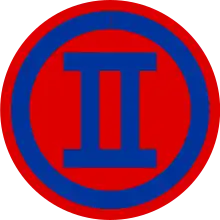II Corps (South Korea)
II Corps (South Korea) is a field corps of the Republic of Korea Army and it was active in the Korean War. It is also known as Double Dragons.
| II Corps | |
|---|---|
 | |
| Active | 24 July 1950 - present |
| Country | |
| Branch | Republic of Korea Army |
| Role | Offensive force |
| Size | Corps |
| Part of | Ground Operations Command |
| Nickname(s) | Double Dragons |
| Colors | Red |
| Engagements | Korean War |
| Commanders | |
| Current commander | Liet. General Ko Hyun-soo |
| Notable commanders | Yu Jae-hung Paik Sun Yup |
History
II Corps was created July 24, 1950, just before the Battle of Pusan Perimeter and it consisted of the 1st Division and 6th Infantry Division.
During the battle of the Pusan Perimeter (July–September, 1950), its headquarters was at Hamch’ang.[1]
Currently, its headquarters is located at the city of Chuncheon.
Korean War
In the 1950s, the United Nations worked to defeat the Korean People's Army (KPA). This army was later reinforced by the People's Volunteer Army.
Taking Back South Korea
U.S. Army General Walker ordered that the scattered ROK Army units, scattered by the North Korean invasion be organized into two corps. Thus the II Corps was born July 24, 1950 to defend the "Pusan Perimeter".[2]
Invading North Korea
On October 10, 1950, the ROK II Corps advanced north of the 38th parallel through central North Korea. They were operating in support of ROK I Corps which was under the command of U.S. Army General Walker. After encountering minimal resistance, they veered northwest.[2]
Defeat at Ch'ongCh'on
On October 24, hoping to end the conflict quickly, General MacArthur ordered all of the UN troops to get to the northern border of North Korea and form a defensive at the Yalu River. At the Battle of the Ch'ongch'on River in October 1950, the Chinese People's Volunteer Army sent its 13th Army in to catch the II Corps off guard. In doing so, battles were fought in various places such as Onjong and Unsan. By November 4, 1950, the II Corps and the U.S. 1st Cavalry division were destroyed.
Current structure
![]() Second Corps, Chuncheon Headquarters
Second Corps, Chuncheon Headquarters
 7th Infantry Division, 'The Seven Stars Unit'
7th Infantry Division, 'The Seven Stars Unit'
- Headquarters and Headquarters Battalion, Hwacheon
- 3rd Infantry Regiment, Hwacheon
- 5th Infantry Regiment, Hwacheon
- 8th Infantry Regiment, Hwacheon
- Artillery Regiment
- 15th Infantry Division, 'The Victory Unit'
- Headquarters and Headquarters Battalion, Hwacheon
- 38th Infantry Regiment, Cheolwon
- 39th Infantry Regiment, Hwacheon
- 50th Infantry Regiment, Hwacheon
- Artillery Regiment
- 27th Infantry Division
- Headquarters and Headquarters Battalion, Hwacheon
- 77th Infantry Regiment, Hwacheon
- 78th Infantry Regiment, Hwacheon
- 79th Infantry Regiment, Hwacheon
- Artillery Regiment
- 2nd Engineer Brigade
- 2nd Artillery Brigade
- 2nd Logistics Support Brigade
- 102nd Signal Brigade
- 721 Signal Battalion
- 722 Signal Battalion
- 702nd Special Assault Regiment
- 302nd Security Regiment
- Armed Forces Hospital at Chuncheon
- Headquarters and Headquarters Battalion, Chuncheon
- Headquarters and Headquarters Company
References
| Wikimedia Commons has media related to II Corps (Republic of Korea). |
- "The Korean War: The Outbreak". www.army.mil.
- "Overview of the Korean War - Korean War Project". www.koreanwar.org. Retrieved 2015-11-09.